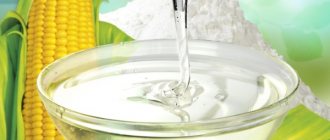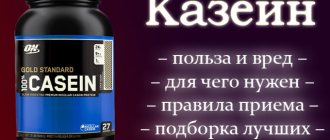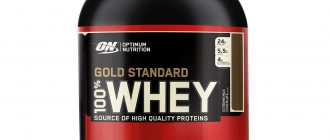What is the difference between the composition and functions of cottage cheese protein and protein. Is it possible to combine them? How much protein per day is needed? The role of sports nutrition in an athlete’s success is difficult to overestimate. The same protein is a constant source of protein, which accelerates the process of muscle growth, suppresses catabolic processes, and adds energy and strength. High-quality protein contains up to 90-95% protein, which can be quickly absorbed by the body, broken down into amino acids, released into the blood, and then to each muscle fiber cell. The result is a rapid increase in muscle mass, energy, increased strength, beautiful relief, getting rid of excess fat, and so on. In general, protein is an effective and time-tested product.
Is there an alternative?
Despite the safety of sports nutrition (in particular, gainer, protein and other supplements), skeptics still remain among athletes. Many of them prefer only natural food, but there are also those who combine sports supplements and protein. What can replace such a useful product? – Many people believe that the optimal replacement is cottage cheese. Let's look at which option is really better?
Indeed, it is impossible to overestimate the benefits of cottage cheese. This is a truly valuable product that is best taken before bed. Why at night? - It's simple. Cottage cheese is casein, that is, a slow protein. It stays in the stomach for a long time and breaks down within 3-5 hours. By eating a portion of the product at night, you can ensure that muscle cells are nourished for a long time, ensure their growth and eliminate catabolic processes.
Types of casein
So, at the moment the sports nutrition market can offer you two types of casein protein:
- Calcium or sodium caseinate
- Micellar casein
The production of the former involves treating milk with various acids, using all sorts of chemicals, which, to put it mildly, is not very good. And the second is obtained using ultrafiltration of milk, approximately according to the same scheme as whey protein is obtained from whey.
If we consider the structure of these two types of casein, the micellar casein will be a lighter protein. Its absorption in the body is better. Athletes who consumed these two types of casein claim that micellar is much better accepted by the stomach and intestines.
What are the advantages?
Cottage cheese is a truly healing product. It is based on high-quality protein (casein), essential carbohydrates and fats. It has already been proven that taking a natural product is an excellent chance not only to gain weight, but also to increase energy levels and give additional strength. If you eat cottage cheese before training (3-4 hours), the body will withstand any stress, and the training will be completed.
The cottage cheese has an ideal composition. It contains at least 50% high-quality casein, the volume of which does not depend on the level of fat content of the product. The rest is quickly digestible protein, which allows you to nourish your muscles and give them an impetus for growth.
In addition to the described components, cottage cheese contains a large amount of calcium, which is needed by bones and muscles, and many minerals and vitamins. As a rule, homemade cottage cheese contains a whole range of useful substances - vitamins PP, C, B and A, magnesium, iron, sodium and so on. Regular protein cannot boast such a luxurious set.
The peculiarity of cottage cheese is the absence of a cellular or tissue structure. Although its “flakes” remain in the stomach for some time, they are completely digested and absorbed without residue. Another big plus is the presence of methionine, which is rich in both store-bought and homemade cottage cheese (but if you compare them, the second option is still better in composition). Why is methionine needed? This is an essential amino acid that is not synthesized by the body. Its plus is a powerful lipotropic effect, lowering cholesterol levels and preventing fatty liver.
Casein in milk: benefit or harm
“The body needs protein,” we hear almost from early childhood. Why, why and for what - few people ask this question. But for those who are interested, the answer is already ready: for cell growth and restoration. However, without even going into the jungle of scientific research, you can simply “turn on” the logic: the protein from which human cells are built differs from both milk protein and meat. Each of them has its own structure. Therefore, milk protein in its original form cannot become a building material for human cells. During the digestion process, any protein entering the human body is “decomposed” into amino acids, and then the protein from which human cells are built is synthesized.
And what is “casein”? Milk protein? You can often hear the following argument in favor of consuming protein: they say, nature intended for a person to feed on mother’s milk from the first days of life. Why not then replace it with an animal analogue? Firstly, to claim that animal milk is an analogue of mother's milk is, to put it mildly, funny. And secondly, the whole question is the presence of enzymes that can break down milk protein, casein. Much has already been said about the fact that an adult does not have such enzymes, but there is a misconception that a child has them. Alas, this is also nothing more than a myth.
According to Professor Dr. Walter Veith, who has long studied the issue of the harm of dairy products to the human body, even newborns lack enzymes that could break down milk protein, casein. The question arises: did nature not initially think through the process of assimilation of mother's milk? But no, nature has thought out everything to the smallest detail. And milk in the child’s body is broken down with the help of specific bacteria that live in the mother’s mammary glands and, entering the child’s body along with mother’s milk, act as enzymes that help break down casein. Thus, only through such a complex process can casein be absorbed from mother's milk. The process of assimilation of cow's milk in the body of a calf occurs in a fundamentally different way: the enzyme renin is already present in the body of calves, which breaks down the milk protein casein. Therefore, cow's milk consumed by a person at any age is not able to be fully digested and absorbed by the body.
Therefore, if we talk about the benefits of milk, then we are talking exclusively about the benefits of mother’s milk for the child’s body. This is a process thought out by nature itself, and such a product is absorbed in the child’s body and contributes to its development. Not only foreign researchers speak about this, but also our compatriot, the well-known academician Ugolev. In his writings, he points out that it is in no way possible to replace mother’s milk with the milk of any mammal without harm to health. In the process of such a replacement, foreign antigens will inevitably enter the child’s body, which will have a very destructive effect on the body, which does not yet have full immune protection.
If you pay attention, children who eat cow's milk supposedly look more well-fed and grow better. And this is the main argument of supporters of eating dairy products. There is also some truth here: the foreign proteins contained in milk are indeed absorbed by the body to some extent, but at the same time they cause irreparable harm to the body itself, since the human gastrointestinal tract is not designed to process such an amount of foreign protein. This affects the kidneys and liver first, and then other organs. Thus, the child’s growth will indeed be rapid, but to the detriment of the internal organs.
Speaking about the benefits of mother's milk and the harm of foreign milk, you can notice some discrepancy. They say that if milk “acidifies” the body, then any milk is harmful - mother’s milk, cow’s milk, and any other. But that's not true. The composition of breast milk and milk of animal origin is radically different. Firstly, the protein content in cow's milk is approximately twice as high as in mother's milk. And the higher the protein concentration, the more acidification of the blood occurs during digestion. Secondly, again, animal milk contains casein, but, unlike maternal milk, it does not contain enzymes to break it down, which leads to its incomplete absorption - and this again “acidifies” the blood. And this is important to understand: the fundamental difference between the composition of mother’s milk and milk of animal origin affects the fact that fundamentally different processes are launched in the body. And in the case of breast milk, these processes are natural and normal, but in the case of animal milk, they are unnatural and harmful to health.
Reception features
Cottage cheese and protein are still different products. The first is based on casein (slow protein), carbohydrates, fats, vitamins, minerals and other useful components. Protein is more limited in this regard. As a rule, it contains only protein - it can be slow, fast, or mixed in equal proportions. At the same time, manufacturers keep up with the times and make their products more and more useful for athletes. In the new complexes you can find not only protein, but a number of other components - useful amino acids, vitamins, and so on.
Many athletes pose the question point blank: “Which is better?” Some say it's cottage cheese, others say it's protein. But ideally, it is better to combine these products. We must not forget that cottage cheese is mostly casein protein. It needs time to be digested and enter the bloodstream. Therefore, the best times to take it are before bed, before training (usually 2-3 hours), or 15-20 minutes after leaving the gym. But in the latter case, cottage cheese is not always effective. Of course, it will provide the body with protein for growth, but due to prolonged breakdown, you can miss the protein-carbohydrate window.
Protein is a more versatile product. If you buy a fast protein supplement, you can safely take the product early in the morning, immediately before or immediately after a workout. In this case, within 40-50 minutes the body receives the necessary nutrition, and the muscles receive the necessary growth.
Can casein benefit everyone?
To answer this question, you need to know what purpose a person pursues when coming to the gym. If, for example, you are overweight and want to lose it, then you need to remember that protein has its own calorie content. 1 gram of protein contains 4 kilocalories. This means that an evening portion of casein, in the amount of 25 grams, will carry with it 100 kilocalories, which in addition to the evening meal may be unnecessary. Accordingly, for people losing weight, this will not be the most correct option and they need to look for another way to combat nighttime catabolism.
If, for example, you are a thin person and want to increase muscle mass, then why not? You took a portion of casein at night and, firstly, provided yourself with a portion of protein, secondly, you solved the problem of night catabolism as efficiently as possible, and thirdly, you fed the body with additional calories, which are so necessary for the growth of muscle mass.
In general, briefly. If you are on weight, then casein will only benefit you. If you are drying out or losing excess weight, then it would be better to abstain from this type of protein or wisely reduce the portion size.
About the protein norm
We must not forget another important point - the daily portion of protein. How much protein does an athlete need per day? As a rule, from 2 to 4 grams, depending on the loads and tasks. For example, if an athlete weighs about 100 kilograms, then the minimum amount of protein per day is 200 grams.
What we have? Cottage cheese is a product high in essential protein. But 100 grams of product contains only 15-17 grams of protein. This means that to replenish the daily requirement you need to eat 1.3 kg of cottage cheese. The challenge is real. But just imagine that such a volume of cottage cheese is needed every day.
Protein wins in this regard. There are about 85-95 grams of protein in 100 grams of product. This means that to cover the norm, only 200-210 grams are needed, which is much easier to implement in practice. If you do some simple cost calculations, protein isn't that expensive.
Casein: to be or not to be in the diet?
Casein is a milk protein, or more precisely, the main type of protein found in milk, cheese, cottage cheese and other dairy products. Whether or not to consume dairy products containing casein is a personal decision, but you should know that this is a foreign component for our body. As the legendary King Solomon wrote: “For everything there is a season, and a time for every purpose under heaven.” Nature intended that a person consume casein in early childhood and only with mother’s milk, only in this case it is absorbed without harm to the body. If we think logically: not a single living creature in the world consumes the milk of another biological species, and even in adulthood.
By violating the laws of nature and including milk of a different biological species in our diet, we harm our body, which is not designed for such a contradiction to the laws of nature. As mentioned above, the need for protein, calcium and everything else is, to put it mildly, somewhat exaggerated. This was done deliberately and for all obvious reasons. There are many analogues of milk and dairy products that are based on plant foods. Such products are much easier for the body to digest and are more natural for us. However, common sense should be exercised and such products should not be abused either. Food that is too fatty and rich in protein is difficult for the body to digest, and in principle it does not need large quantities.
Flaws
Of course, the benefits of casein protein are undeniable, but there are also harms that we should mention:
- firstly, today it is increasingly difficult to find high-quality casein due to the oversaturation of the market with various counterfeits. At the same time, most sports nutrition manufacturers rarely make casein protein on their own - often it is simply purchased in large quantities. At the same time, where and from whom is not entirely clear. In such cases, serious harm to the body can be caused;
- secondly, not all athletes are satisfied with the low rate of protein absorption. Although, this is more of a feature than a drawback. But the fact remains that many athletes refuse to take casein protein precisely for this reason;
- thirdly, some people are allergic to casein, which is undoubtedly harmful. It is very easy to determine this factor by the appearance of diarrhea, stomach pain, nausea, and so on. By the way, with an overdose of protein, the negative manifestations can be similar. The harm lies in the fact that a casein sediment forms in the stomach, which the body simply cannot digest.
Advantages and purpose
As practice and research shows, the benefits of this type of protein are very significant. This is the best nutrition for people who lead an active lifestyle and spend a lot of time in the gym. At the same time, numerous experiments only confirm the unique properties of casein, which in its qualities significantly surpasses protein of plant and protein origin. In particular, casein (as well as other types of animal proteins) contains a full range of essential amino acids, including those that are not synthesized by the body.
The great benefit of such protein is the consistency with which it is absorbed by the body over a long period of time. By drinking your portion once at night, you can be sure that your muscles will receive everything they need until the morning and the next meal. An important role, as we have already mentioned, is played by powerful anti-cabolic abilities, which prevent the “burning” of one’s own muscle mass due to a lack of nutrients from the outside.
It is generally accepted that casein protein is exclusively “overnight” protein, but this is not entirely true. It will be an excellent assistant during the day, during long breaks between meals. We must not forget about such an advantage of casein as the presence of calcium in the composition. By the way, this element is simply necessary to strengthen bone mass and fight excess weight.
So, the main benefits of casein protein:
- in powerful stimulation of protein synthesis in muscle fibers;
- complete supply of the body with high-quality protein;
- in reducing appetite and, as a result, providing a long-term feeling of satiety;
- in powerful anti-catabolic qualities that no other type of protein can boast of;
- the presence of calcium, which is so important for the formation of strong bone mass.
At the same time, casein protein will be effective primarily for bodybuilders who pay special attention to sports performance, athletes, vegetarians and people who need to replenish their body with high-quality protein.











